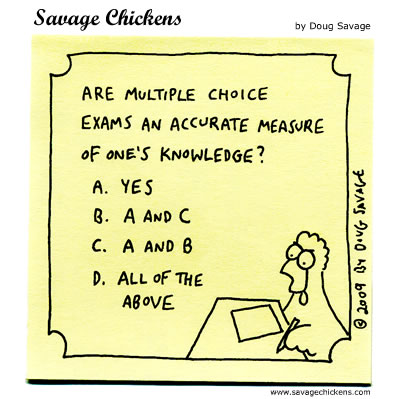
In your journals, please answer the following question: What is a zigger?
A. A zogger
B. A zummer
C. A zooker
D. A zaller
The correct answer is B. For those of you who got it, congratulations. For those who didn't, well you obviously should have.
Pretty absurd, right? Well, not so much...
The above example is a variation of one given to me by my college adviser when he explained the evils of standardized testing, more specifically, that of multiple choice testing. This past week I had to watch students bubble in answers on state tests for four hours on two consecutive days. We have two more such days this upcoming week. Students are being asked to bubble in one of these four letters as a way to demonstrate how much they have learned throughout the year. If they are good bubblers then our school gets positive recognition. If they are bad bubblers, then it hurts our school. And yet, questions like the one in the cartoon and the one mentioned above are exactly what our students will see when dealing with the multiple choice subject tests given each year by the state of California and every other state across the nation.
Multiple choice tests are not a reflection of student knowledge. At all. They are a reflection of who is good at guessing. Think about it. The next time you or someone you know take a standardized test, try a little experiment if you have time. Go through a section, reading only the questions and not the answers. Put a mark next to all those you can answer without the multiple choice options. Odds are pretty slim, right? Maybe there's a question here and there that you could answer. But for the vast majority of the questions you will need to see the four possible answer choices. Therefore, you don't really know the answer. But you can be a good guesser and arrive at the right answer eventually. So did your history teacher this year spend all his time teaching you content or did he spend all his time teaching you how to guess? Odds are the guessing lessons were nowhere to be found.
And yet, this is exactly what multiple choice tests do to our students. Sure, there are test taking strategies such as eliminate ones you know it can't be, make educated guesses, etc. But when push comes to shove what multiple choice tests do is assess how good our students are at guessing. And let's be honest: These tests expect these kids to be pretty damn good guessers. None of the above, all of the above, B and C only. These tests expect them to be Nostradamus good at making predictions. We all know somebody super smart who bombed the SAT. We all know somebody non-so-smart who aced it. The difference? One was a poor guesser and the other was a great guesser. These great guessers end up going on to fame and fortune and those of us who can't guess as well lose out on many opportunities. Life really is a guessing game in this regard.
All this begs the question why. Why do we assess our students in this idiotic manner? Wouldn't it be much simpler to have students show off their knowledge in written or oral form? Instead of nitpicking certain elements, why not offer students multiple ways to demonstrate what they have learned? How amazing would it be to show the state of California how much we have learned this school year through the magic of art, song, dance, and performance? An actual painting for an art class. A video-taped reenactment for a famous historical event. A recording of a spoken word poem highlighting the various uses of voice in a poem. A written proof in geometry, using all the rules one had learned throughout the process. Yes, I can see it now. Cardboard boxes filled with student work being sent to Sacramento to be scored accurately by individuals who are experts in the various content areas. A true testament to student learning right there in the flesh.
And then I awaken from my idealistic slumber. Much like most things that make sense in public education today, this will not happen. The reason? Money. Cash. Cashola. The Almighty Dollar. The buck stops here. Literally. Yes, friends and family, we put the futures of students, school, and even entire school districts in the hands of our students' guessing abilities so that we can save money. That's it. That's your reason. We make our students bubble in letters so that we can ship up boxes to a secured location in Sacramento. Once there, student score sheets will be fed into computers that tell us how well students, schools, and districts guessed. The test booklets, where students took notes, showed work, and eliminated wrong answer choices? Discarded. Partial credit doesn't exist in the guessing world. These supercomputers tabulate the results and get them back to us within a few weeks. And we all know that these counting machines never ever make mistakes. Unless you're counting the 2000 presidential election...
So, in the coming week or so as you watch your students bubble in letters, think about your teaching. Was it really important that your students wrote personal narratives about themselves and their lives? Was it important that they created their very own webpages? That they made scrapbooks about life in the 1920's? That they read about current events and debated current immigration policy? That they made Styrofoam skulls and labeled all the parts of the brain? The answer to all these questions should be a resounding no. What you should have been teaching all along was the proper way to guess. Because after all according to state testing agencies, that is the only skill a student needs.
No comments:
Post a Comment